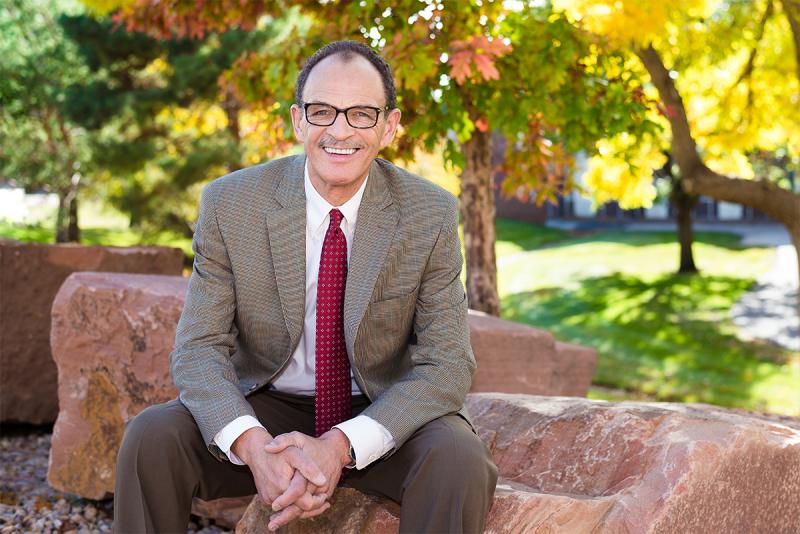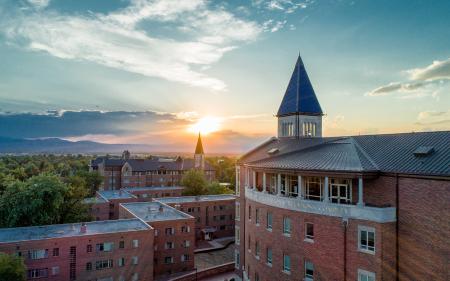Curtain Call
As he retires from the social work stage, Prof. William Cloud is celebrated as a teacher, mentor and scholar

On a summer afternoon two decades ago, Professors William Cloud and Robert Granfield developed their recovery capital construct while grilling burgers in Cloud’s backyard. The idea reframed the addiction and treatment field, but recovery capital’s genesis was much earlier.
The lineage of Cloud’s transformative idea can be traced back to the neighborhood Cloud grew up in in Chattanooga, Tennessee; to Vietnam War protests, the civil rights movement and the counter culture of the 1960s and 70s; to post-war college campuses; to Cloud’s experiences as a substance abuse counselor and also as a case worker for the Chattanooga Department of Human Services. In those formative years, Cloud saw many people use drugs yet still go on to thrive while others lost the battle with addiction.
“How is it that some people are able to get over addiction and others aren’t? Some people enter treatment four or five times and still struggle with it; others never enter treatment and they’re doing fine,” says Cloud, PhD ’87, who is retiring in December after 30 years as a University of Denver Graduate School of Social Work (GSSW) professor.
The difference, he observed, was that those who were “doing fine” had more social capital than those who were struggling with addiction. “I knew people who had done drugs in college and went on to successful careers. Those who used drugs and stayed home in the neighborhood didn’t,” Cloud says. “I saw that poverty was a barrier to getting well. That was enlightening.”
Cloud’s insight — shaped by his personal experience as a Black man — carried through his career and culminated in the recovery capital concept.
The Path to Social Work
Cloud had started acting in first grade, and initially, he planned to be an actor. He enrolled in Tennessee State University in Nashville, one of the state’s historically Black colleges and universities (HBCUs), with a major in speech and drama. “I changed my major to social work because I wanted to have an impact on people’s lives. The dreamy stuff about acting wasn’t a contribution; I wanted to do something rewarding where I could make a difference.”
For Cloud, the first person in his family to go to college, the path to a degree wasn’t a straight line. He dropped out for a time and returned to Chattanooga, earned a two-year social work degree from a community college, worked, and then returned to Tennessee State to finish his BSW.
“I did well when I returned to college. I was president of the social work honor society and the student government representative from the social work department,” says Cloud, who received a minority scholarship to pursue his MSW at the University of Louisville. “My intentions were to go back into practice in mental health and substance abuse after getting my MSW.”
But Cloud never returned to clinical practice. Instead, he accepted an offer to teach at LeMoyne-Owen College, a small HBCU in Memphis, Tennessee.
With help from another minority scholarship — the Council on Social Work Education (CSWE) Minority Fellowship Program — Cloud attended GSSW to pursue his PhD. He returned to LeMoyne-Owen College with his doctorate, directing the school’s social work program and founding a community development program at a housing project across from the school. Cloud joined the GSSW faculty in 1990, and in 1991 he co-founded GSSW’s Bridge Project, a positive youth development after-school program modeled on the community development program he’d started in Memphis. Over 29 years, the program has served more than 1,000 youth living in Denver public housing communities.
A Starring Role as a Teacher and Mentor
Although he never returned to direct practice, Cloud has fulfilled his goal to make a difference as a teacher and mentor. He has stayed in touch with many of his former students, who he speaks of with pride and admiration.
“He always pushed me to be better. Nobody has ever pushed me the way he did. He was on my back, in a good way,” says Nicole (Ennes) Bryant, MSW ’17, who is completing an EdD in behavioral health leadership at Grand Canyon University. “I’m only 25, but I’ve had leadership positions that I didn’t think I could get. I ran a 241-bed facility when I was 22. I never thought it would happen, but it did because of him.”
Cloud was Bryant’s first-ever African American teacher, and she says that representation in the classroom mattered. “He went out of his way to say ‘Hi’ and became like a father figure to me,” Bryant says. “If I was struggling with something on campus or socially in the world, I could go to his office and have a conversation.”
GSSW Associate Professor Kate Ross, MSW ’97, agrees. “There were always all these people gathered outside his office door,” she recalls. “We’d get into these really good conversations — we were so engaged.”
That engagement started in her first course with Cloud, Ross says. Twenty-five years later, she vividly recalls that community practice course. “He asked us to write a quick proposal for a grant. Some of the students were the foundation making the decision, some were pitching the grant. I remember this exercise so well because we were so engaged.”
“I remember loving learning in his class and laughing all the time,” Ross says. “He had this mixture of provocative topics that challenged us but also provided a context that made us wonder.”
Cloud ignited that sense of wonder in Brian Polovoy, MSW ’14, LCSW. “I was really interested in substance use disorder from a practical and policy perspective,” Polovoy says. “I started talking to William and began to subscribe to his research on natural recovery. I began to see substance use disorder and treatment from a different, more practical lens. What started as a mentorship became a friendship and an exchange of ideas.”
Part of what makes Cloud such an effective teacher and mentor, Polovoy and other former students say, are his warmth, his curiosity, his honesty, his insight. He shares his knowledge, but in a way that encourages students to arrive at their own conclusions.




